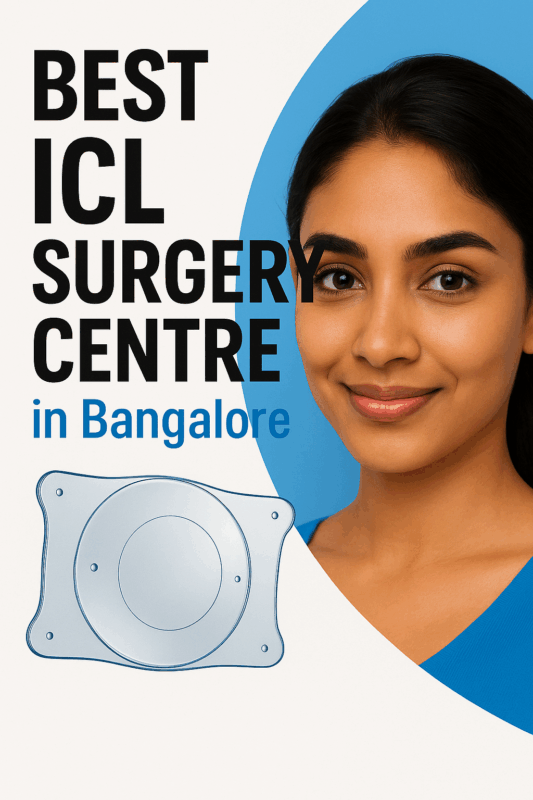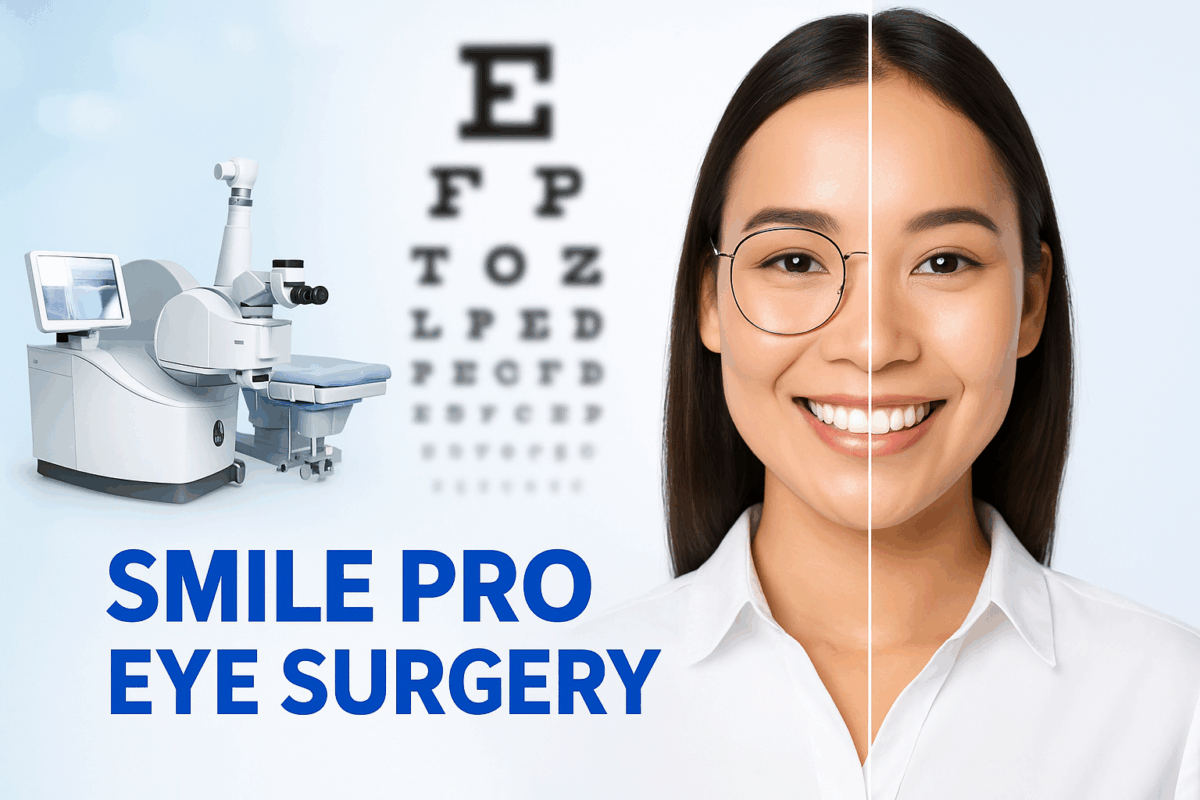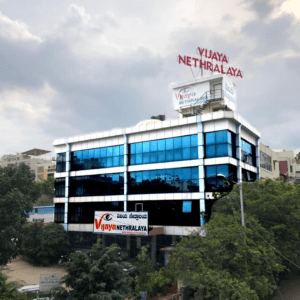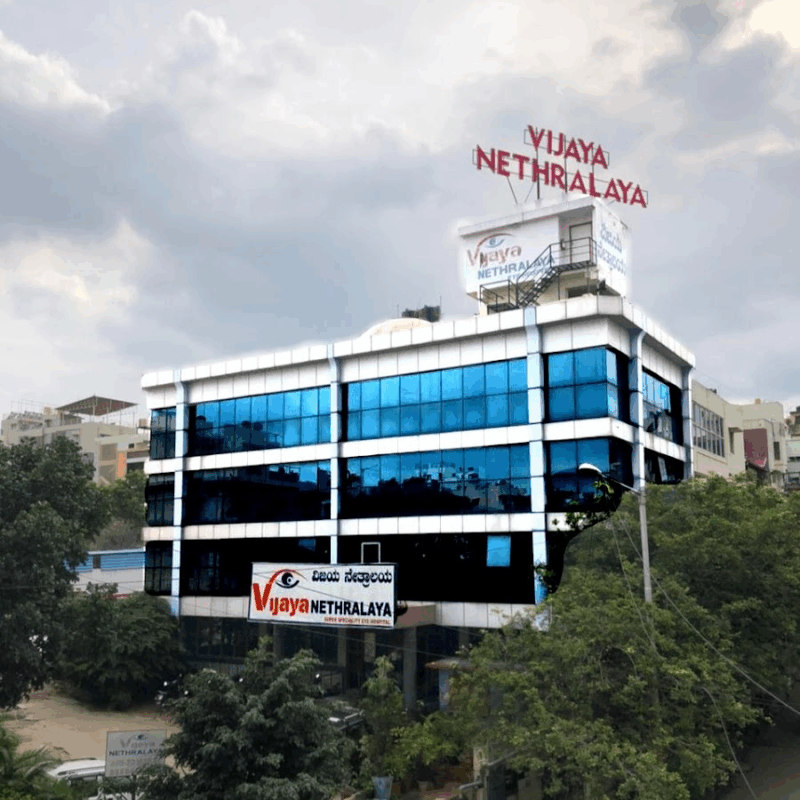Introduction
In today’s digital age, vision correction is one of the most sought-after solutions, especially for individuals struggling with refractive errors like myopia, hypermetropia, and astigmatism. LASIK (Laser-Assisted in Situ Keratomileusis) eye surgery has revolutionized the way people approach vision correction, offering a permanent and effective alternative to glasses and contact lenses. If you’re considering LASIK in Bangalore, you’ve come to the right place. In this guide, we’ll explore LASIK in detail, including what it is, who it benefits, the procedure itself, and why Vijaya Nethralaya Eye Hospital stands out as the best option for LASIK treatment in Bangalore.
What Is LASIK Eye Surgery?
Surgeons perform LASIK eye surgery to reshape the cornea, the clear front surface of the eye, and treat various vision problems. The goal of LASIK is to correct refractive errors like myopia (nearsightedness), hypermetropia (farsightedness), astigmatism, and more, thereby reducing or eliminating the need for glasses or contact lenses. LASIK alters the corneal shape using laser technology to focus light correctly on the retina, resulting in clearer vision.

Which Conditions Can LASIK Treat?
LASIK surgery is effective in treating several refractive vision problems, primarily:
1. Myopia (Nearsightedness)
Myopia is a condition where distant objects appear blurry while close objects are clearly visible. This occurs when the eyeball is too long or the cornea is too steep, causing light to focus in front of the retina. LASIK works by flattening the cornea, allowing light to focus correctly on the retina and improving distance vision.
2. Hypermetropia (Farsightedness)
In hypermetropia, close objects appear blurry while distant objects are clearer. This condition is typically caused by a short eyeball or a cornea that is too flat. LASIK addresses this by reshaping the cornea to make it steeper, enabling light to focus on the retina more precisely.
3. Astigmatism
Astigmatism results from an irregularly shaped cornea or lens, causing distorted or blurry vision at all distances. LASIK treats astigmatism by smoothing out the cornea, correcting its curvature, and restoring clear, sharp vision.
4. Contoura Vision
Contoura Vision is a state-of-the-art laser treatment that provides customized vision correction. It maps the unique contours of the eye’s surface to deliver a highly personalized treatment. It is particularly beneficial for patients with irregular corneas or who have previously had poor outcomes with traditional LASIK procedures.
Benefits of LASIK Eye Treatment
LASIK offers a variety of benefits that make it a preferred solution for many people:
- Quick Recovery: Unlike traditional methods of vision correction, LASIK offers a fast recovery time. The majority of patients are able to return to their regular activities within 1 to 2 days after the procedure.
- Permanent Results: LASIK is a permanent solution for refractive errors, with many patients experiencing long-term benefits and rarely needing further adjustments.
- Improved Quality of Life: With clearer vision, many LASIK patients experience improved quality of life, including enhanced mobility, reduced dependence on glasses or contact lenses, and better overall visual comfort.
- Minimal Pain: The LASIK procedure is minimally invasive and typically involves little to no pain, as a numbing eye drop is applied before the surgery.
- Cost-Effective in the Long Run: Although the initial cost of LASIK surgery may seem high, in the long term, it can save money spent on glasses, contact lenses, and maintenance.
Steps of LASIK Eye Surgery
Pre-Operative Stage
Before the surgery, a thorough eye examination is conducted to assess your eye health and determine if you’re a suitable candidate for LASIK. The following steps are involved:
- Eye Examination: The doctor will check the thickness of your cornea, pupil size, and the overall health of your eyes.
- Consultation: Discuss your medical history, expectations, and concerns with the surgeon.
- Preparation: The patient is instructed to avoid wearing contact lenses for a certain period before the surgery, as they can alter the shape of your cornea.
During Surgery
The procedure is usually performed under local anesthesia (numbing drops), and the patient remains awake throughout the surgery. It typically takes 15 to 30 minutes per eye. The steps are:
- Flap Creation: A thin corneal flap is fashioned using either a microkeratome or a femtosecond laser to access the underlying tissue.
- Reshaping the Cornea: The surgeon uses a laser to reshape the corneal tissue underneath the flap, addressing the refractive error.
- Repositioning the Flap: The corneal flap is repositioned and naturally adheres to the eye without the need for stitches.
Post-Operative Stage
Post-surgery, most patients experience a significant improvement in vision within a day or two. Aftercare involves:
- Follow-Up Visits: Patients are typically required to visit the clinic the day after surgery for a post-operative check-up.
- Medication: Eye drops may be prescribed to prevent infection and promote healing.
- Rest and Care: Patients are advised to avoid strenuous activities and limit screen time during the initial recovery period.

LASIK/Laser Eye Surgery Options in Bangalore
Bangalore offers world-class refractive surgery options. Here’s what’s available:
Standard LASIK
Traditional method using a microkeratome blade to create the flap. Effective and economical but slowly becoming outdated.
Bladeless/Femto LASIK
Uses a femtosecond laser for a bladeless, highly precise flap creation. It’s safer and more comfortable.
Contoura Vision LASIK
The most advanced LASIK option, offering topography-guided vision correction. Custom-designed to match the unique map of your eye’s surface—perfect for those with corneal irregularities.
ReLEx SMILE
A minimally invasive, flapless laser procedure. Ideal for people with dry eyes or active lifestyles. Recovery is even faster.
LASIK Eye Surgery Cost in Bangalore
Factors That Affect the Cost
- Type of LASIK (Standard, Bladeless, Contoura, SMILE)
- Surgeon’s expertise
- Technology used
- Preoperative and postoperative care
Average Pricing in Bangalore
ReLEx SMILE: ₹60,000 to ₹80,000 per eye
Standard LASIK: ₹25,000 to ₹40,000 per eye
Bladeless LASIK: ₹40,000 to ₹60,000 per eye
Contoura Vision: ₹55,000 to ₹75,000 per eye
Vijaya Nethralaya: The Best Eye Hospital for LASIK Surgery in Bangalore
World-Class Technology
Vijaya Nethralaya uses the latest LASIK technology, including femtosecond lasers and Contoura Vision, to deliver precise, customized treatments that maximize visual outcomes. This guarantees that patients benefit from the latest and most efficient eye care treatments.
Why Choose Vijaya Nethralaya Eye Hospital for Your LASIK Eye Surgery?
Founded over 40 years ago by Dr. Appaji Gowda, an esteemed ophthalmologist, Vijaya Nethralaya has established itself as a leader in eye care. The hospital offers comprehensive LASIK care and boasts a highly skilled team of doctors who specialize in the latest vision correction techniques. Thousands of successful LASIK surgeries have been performed at the institution, which is renowned for its patient-centered approach and personalized care.
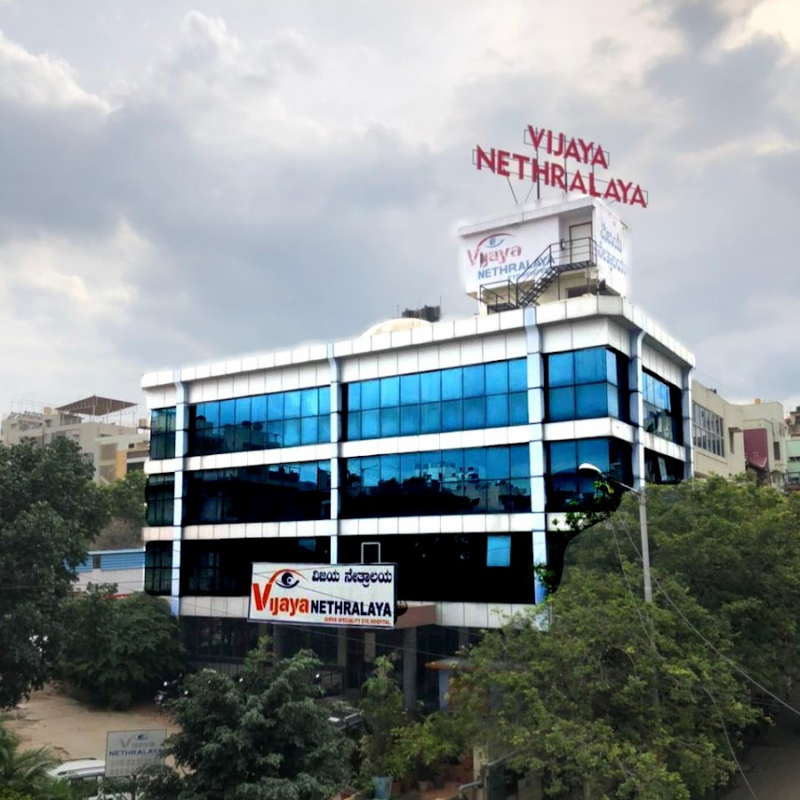
Comprehensive LASIK Care
At Vijaya Nethralaya, patients receive not just surgery but comprehensive care, from pre-operative evaluations to post-operative follow-ups. This ensures the best possible outcome and a smooth recovery process.
Best LASIK Eye Surgery in Bangalore
With advanced technology, highly skilled surgeons, and a focus on patient safety, Vijaya Nethralaya stands as the top choice for LASIK surgery in Bangalore. It is a trusted name for those seeking reliable and world-class eye care.
Conclusion
LASIK eye surgery offers a life-changing solution for individuals seeking freedom from glasses and contact lenses. It’s important to choose a hospital that offers state-of-the-art technology, experienced surgeons, and comprehensive patient care. Vijaya Nethralaya Eye Hospital in Bangalore stands out as a trusted institution for LASIK surgery, offering personalized treatment plans tailored to each patient’s needs. With advanced laser technologies like Contoura Vision and a legacy of over 40 years in ophthalmology, Vijaya Nethralaya ensures the highest standards of safety, precision, and patient satisfaction.
If you’re considering LASIK eye surgery, consult with a qualified ophthalmologist at Vijaya Nethralaya for a thorough evaluation and professional guidance to determine if LASIK is the right choice for you.
Author Details:
Dr. Sushruth Appajigowda holds a prominent position as a Cornea, Cataract, Glaucoma, and LASIK Surgeon in Bangalore. He serves as the chief Cataract and Refractive surgeon at Vijaya Nethralaya Eye Hospital, Nagarbhavi Bangalore. Renowned as one of the finest LASIK surgeons nationwide, he brings with him over 12+ years of experience across multiple LASIK platforms, including ZEISS, ALCON, SCHWIND, AMO, and Bausch and Lomb. Having successfully conducted over 5000 LASIK procedures, Dr. Sushruth holds the title of a Certified Refractive Surgeon and a Fellow of the All India Collegium Of Ophthalmology. Furthermore, he stands as a distinguished speaker at various National and International Forums, using his expertise to guide you in selecting the most suitable procedure based on your health requirements.

http://vijayanethralaya.com/link-in-bio/
(FAQ)
1. Does Laser Eye Surgery Hurt?
No, LASIK surgery is virtually painless. Numbing eye drops administer local anesthesia to make the procedure painless. Patients may feel slight pressure during the surgery but do not experience sharp pain. After the procedure, mild discomfort or a gritty sensation may occur, which usually resolves within a few days.
2. How Long Does Laser Eye Surgery Take?
The actual LASIK procedure typically takes about 15 to 30 minutes per eye. However, the pre-operative preparations and post-operative recovery may require additional time.
3. When Can I Go Back to Work After Having Laser Eye Surgery?
Most patients can return to work within 24 to 48 hours after the procedure, depending on the nature of their job. Doctors may recommend a few extra days of rest for jobs that involve intense screen time or physical labor.
4. Is Laser Eye Surgery Safe?
Yes, LASIK is a highly safe and effective procedure with a success rate of over 95%. It has been performed millions of times globally with excellent outcomes. However, as with any surgical procedure, there are risks, which is why a thorough pre-operative assessment is crucial to ensure suitability.
5. Should I Keep Reading Glasses with Laser Eye Surgery?
Most patients experience significant improvement in vision after LASIK and no longer require reading glasses for common tasks. However, some people, especially those over 40, may still need reading glasses due to presbyopia, a natural age-related condition that affects near vision.
6. When Is a LASIK Eye Surgery Procedure Not Recommended?
LASIK is not recommended for individuals with:
- Thin corneas
- Uncontrolled eye conditions (e.g., glaucoma, cataracts)
- Severe dry eye syndrome
- Autoimmune disorders
- Pregnancy or breastfeeding (due to hormonal changes affecting eye health)
A comprehensive eye evaluation will determine if LASIK is suitable for you.
7. What Is Bladeless LASIK?
Bladeless LASIK, also known as femtosecond LASIK, uses a laser to create the corneal flap instead of a mechanical blade. This technique offers greater precision, faster recovery, and reduced risk of complications compared to traditional LASIK.
8. Is ReLEx SMILE the Same as Bladeless/FemtoLASIK?
ReLEx SMILE (Small Incision Lenticule Extraction) is a newer, minimally invasive laser vision correction technique. Unlike femtosecond LASIK, which creates a large flap, SMILE uses a small incision, reducing the risk of dry eyes and offering faster recovery. While both are bladeless, SMILE is distinct from traditional LASIK procedures.
9. What Is Contoura Vision? Do I Need Contoura Vision Instead of LASIK?
Contoura Vision is an advanced, customized LASIK technique that maps the unique topography of your cornea to correct complex vision issues with higher precision. It is especially beneficial for individuals with irregular corneas or those who have not achieved optimal results with standard LASIK.Your specific eye condition, determined during your consultation, will decide whether you need Contoura Vision or traditional LASIK.




